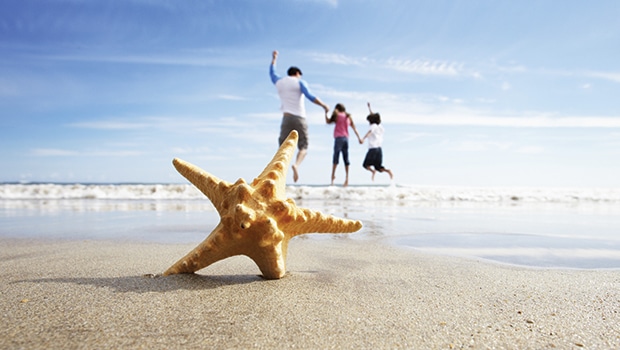Planning a holiday is an exciting time filled with the anticipation of relaxation, adventure and new experiences. But nothing can dampen a trip faster than unexpected health issues, especially ones that could have been easily prevented with a little preparation.
Whether it’s the harmful effects of the sun on your skin, the discomfort of foot problems, or the nuisance of insect bites, being unprepared for these common travel woes can turn your dream getaway into a nightmare.
Save your skin (and the sea)
Protecting your skin from the sun’s harmful rays is essential for both immediate comfort and long-term health, with prolonged sun exposure leading to painful sunburns, premature aging, and an increased risk of skin cancer. “Preventing sunburn is not just about comfort – it’s also a critical measure to reduce the risk of skin cancer, including melanoma, which can be very serious. Prompt and effective treatment helps minimise discomfort and supports the healing process, but the best strategy is always prevention,” says Youth Lab’s Dr Kate Jameson.
“Sunburn can seriously damage the skin’s outer layer of skin, affecting its barrier function. The damage can then lead to water loss resulting in the skin becoming dry and less elastic, it can also reduce the skin’s ability to protect against pathogens and other harmful substances. Repeated sunburn can also accelerate aging in the skin and significantly increase the risk of skin cancer.”
SPF plays a crucial role in shielding your skin from UV radiation, however not all sunscreens are created equal. Travellers are becoming increasingly concerned with the impact their sunscreen has on marine life, and rightfully so, as severe coral bleaching events have been recorded on reefs across the world.
“Suncreams or sunblocks are often made of a mix of ingredients. Key ones being, Zinc Oxide, Avobenzone and Oxybenzone” explains MD of incognito, Howard Carter. “Chemical suncreams are generally cheaper than their natural counterparts and will screen you from the harmful rays just as well, but at what cost. While sun-blocking ingredients like oxybenzone, octinoxate, and octocrylene have been deemed safe for human use, they have been found to exacerbate the reef bleaching associated with warming ocean temperatures.”
An estimated 14,000 tonnes of these toxic chemicals found in traditional sunscreens enter the waterways each year, with significant amounts in areas heavy with tourism. Studies have shown that even small doses of these chemicals can have a lethal effect, causing coral bleaching, disrupting the growth and reproduction of marine organisms, and harming other aquatic life.
When selecting a marine-safe sunscreen, it’s essential to check the labels and look for certifications or indications that the product is reef-safe. “Unfortunately, none of the many logos & certifications are regulated therefore the only way of really knowing is by looking out for reef-harming chemicals and buying products containing zinc or titanium dioxide, both are safe,” adds Carter. “incognito Sunblock Insect Repellent SPF30 can help reduce the impact on the seas and oceans for those who need and use sun and insect protection products. It is reef friendly, kind to the environment and is clinically tested to be effective against UVA + UVB light as well as insects.”
“if we continue harming the world’s reefs … 90 percent of these important ecosystems could be functionally extinct by 2030.”
Things could soon be changing for the better in the marine-safe SPF space, with the development of the world’s first sunscreen that is not only reef-safe but is proven to actively feed and nourish coral whilst protecting human skin. The biodiversity-positive sunscreen Reef Relief is a collaboration between Florida-based skincare label Stream2Sea, coral scientists from the University of Derby (UK), led by UN marine advisor Professor Michael Sweet, and global ad agency McCann. Reef Relief protects and soothes your skin with a non-nano Titanium Dioxide base to prevent UVA/UVB rays from damaging the skin whilst actively supporting coral. Through six months of testing, Reef Relief was proven to boost coral growth by as much as 8% in some species.
“Coral reefs are one of the most important ecosystems on the planet, supporting more than 25 percent of marine life and one billion people worldwide. Reefs are also estimated to have a total global value of $2.7 trillion per year, because of their provision of food and medicine, contribution to tourism and the coastal protection they provide. However, if we continue harming the world’s reefs and do not make any substantial changes to our carbon footprint and other stressors associated with reef decline, 90 percent of these important ecosystems could be functionally extinct by 2030,” warns Michael Sweet, molecular ecology professor at the University of Derby and coordinating author for the UN World Ocean Assessment, in a promotional video for the sunscreen.
Buzz off
Insect bites can be an annoying and sometimes painful part of any holiday, particularly in tropical or wooded areas where mosquitoes, ants, and other insects thrive. While conventional insect repellents and treatments are effective for most, they often contain harsh chemicals such as DEET, which can cause skin irritation and environmental harm.
“Citronella works by masking scents that are attractive to insects; as such, biting of stinging insects find it difficult to locate their target to feed, thus providing the wearer with natural protection.”
Natural insect repellents are a great alternative to chemical-based products. Essential oils such as citronella, eucalyptus, and lavender have been shown to repel a variety of insects effectively. Citronella oil, for example, masks scents that attract insects, making it harder for them to locate you.
“One of the main disadvantages of various insecticides including DEET is the environmental impact they cause – DEET has a moderate toxicity to aquatic species. Whilst many powerful insecticides are indeed superb at killing insects, they’re also highly toxic, which is problematic for the environment,” says Carter. “Fortunately, Citronella (PMD) works differently than these toxic insecticides, in fact the United States Environmental Protection Agency includes Citronella oil on its list of minimum risk pesticides. Instead of killing insects like mosquitoes, Citronella works by masking scents that are attractive to insects; as such, biting of stinging insects find it difficult to locate their target to feed, thus providing the wearer with natural protection.”
Natural insect repellents are as effective as chemical repellents, with the added benefits of being chemical-free to support those with sensitive skin and pre-existing skin conditions. “Natural insect repellents such as incognito have been clinically tested to provide 100% protection against Aedes aegypti – Zika and Dengue carrying mosquitoes – for 4.5 hours and good protection for up to 7 hours,” adds Carter.
“They contain biodegradable natural ingredients that do not pollute the planet. incognito has displaced or avoided approximately 250k litres of DEET entering and polluting the environment since it began trading in 2007.”
Put your best foot forward
For some, foot health might be at the bottom of their travel health lists, but maintaining good practice while on holiday is crucial for ensuring a comfortable and enjoyable travel experience. The combination of increased physical activity, unfamiliar terrains, and changes in climate can take a toll on your feet, leading to discomfort or even injury. Proper foot care can prevent common issues such as blisters, swelling, and infections, allowing you to fully immerse yourself in your holiday activities without the distraction of foot pain.
Choosing the right footwear is the first step in promoting foot health on holiday. “The foot skin is highly adapted to a whole range of different environments; however you will certainly want to wear different styles and designs of shoes for different situations,” says Mr David Gordon, Foot and Ankle Surgeon, aka The Bunion Doctor. “Don’t walk barefoot on the beach as sand can get extremely hot and you can burn the soles of your feet and small shards of glass or other litter can cause an injury. If you’re trekking in the mountains, then a good sturdy hiking boot that comes well above the ankle is important to reduce the risk of injury and ensures each step is as sure footed as the last. As urban areas tend to be more predictable, you don’t need something as sturdy as a hiking boot, so a thick, well cushioned, softer sole, like a running shoe, would be ideal.”
“I would not recommend buying a brand new pair of footwear and wearing them the first time at your destination. There might be a temptation not to wear socks with shoes due to the heat but socks provide an important cushion and barrier to the foot skin and can prevent blistering and discomfort.”
Keeping your feet clean and dry is essential to prevent fungal infections and other skin issues. In hot and humid climates, feet can sweat more, creating a breeding ground for bacteria and fungi. Ensuring your feet are cleaned daily and thoroughly dried will reduce the risk of a fungal infection.
“The most important thing after a long day on your feet is to check for any redness or potential blisters and try and protect these areas if you’re going to be out in your feet for consecutive days. Making sure your feet are thoroughly cleaned and dried and ensuring your toenails are adequately cut will reduce the risk of problems,” adds Gordon.
Allergic reaction
“Many hay fever sufferers will tell you that nothing works, or that some remedies help, but nothing does the whole job.”
Hay fever can be a significant inconvenience during holidays, particularly in regions with high pollen counts. Symptoms such as sneezing, itchy eyes, and a runny nose can diminish the enjoyment of outdoor activities. While over-the-counter medications can be effective, they often come with unwanted side effects like drowsiness. Natural solutions offer a gentle yet effective alternative to managing hay fever symptoms, helping you enjoy your holiday without discomfort.
“Many hay fever sufferers will tell you that nothing works, or that some remedies help, but nothing does the whole job. Or what worked last year doesn’t work this year. It is very frustrating,” says airborne allergens expert and creator of HayMax, Max Wiseberg.
“There is no cure for hay fever – although they are working on it, and have been for many years. One day there may be a cure, but in the meantime, there are lots of different ways to help, and remedies work in several different ways, so can be taken individually or in combination to help combat the symptoms. The interesting thing about this is that many remedies can be complementary to each other. So if one helps, but doesn’t do the whole job, the sufferer may be able to try other remedies at the same time and get a better result.”
“My recommendation is one or more natural products, including a drug-free allergen barrier balm such as HayMax, one (and only one) antihistamine, one (and only one) steroid nasal spray and eye drops.”
Diet can play a crucial role in managing hay fever, with the Mediterranean diet recommended for allergy sufferers due to its high levels of immune-boosting antioxidants. Many plants such as Aloe Vera, Chamomile, Ginger, Horseradish and Liquorice root can all ease inflammation and provide mild antihistamine properties.
“Turmeric is commonly used in Middle Eastern and Asian cuisine, turmeric is a spice containing curcumin, which has been found to have anti-allergy properties. Most often used in dried form, it can also be bought fresh. It looks similar to ginger root. Put on your rubber gloves (it stains!), peel a section and grate, then add about two teaspoons to rice dishes, stir-fries or soups. Or anything else you fancy,” comments Wiseberg.
Essential oils can provide significant relief from hay fever symptoms through their anti-inflammatory and decongestant properties. Eucalyptus oil, for example, can open up nasal passages and improve airflow, as can Pine and Rosemary. Lavender oil is known for its calming and healing properties, while Chamomile is soothing and can lessen your reaction to pollen.
“A blend of chamomile, lavender and lemon added to your bath or diffused in a burner may help relieve symptoms, particularly at night before you go to sleep. It is important to note that you should not put pure, undiluted essential oils (except for Lavender) directly onto the skin. Always research how to use essential oils before use.”
Sunly – Sunscreen Stick – Tropical – 30 SPF
ATTITUDE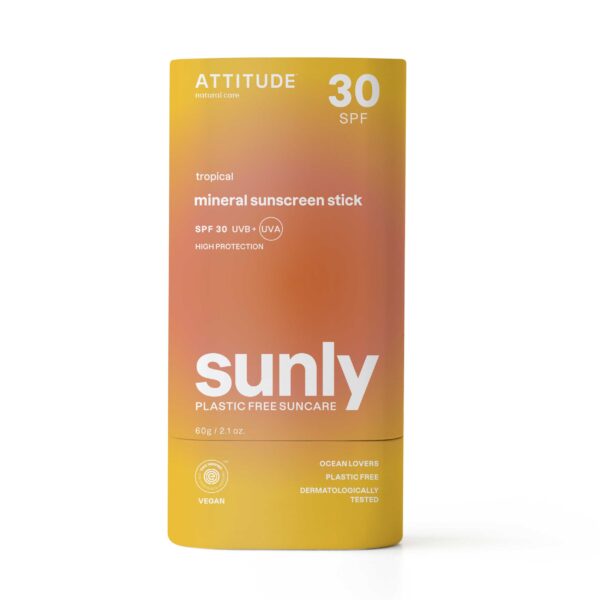
https://ca.attitudeliving.com/
Protect your skin with Sunly. ATTITUDE™ SPF 30 sunscreen stick is formulated with non-nano zinc oxide to limit our impact on coral reefs. This mineral filter provides broad spectrum protection against UVA and UVB rays. Practical and environmentally friendly, this sun protection stick comes in a biodegradable cardboard tube and applies easily without leaving white traces. Its EWG VERIFIED™, vegan and dermatologically tested formula lets you enjoy your vacation outdoors with peace of mind!
Yogi Tea® Wellbeing Organic
Yogi Tea distributed by Euro Food Brands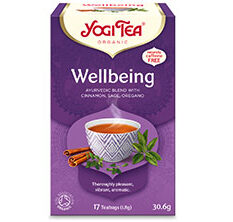
www.yogitea.com/en/
Wellbeing begins with the willingness to experience it. This tea guides and accompanies you to a sunny time-out. With warming cinnamon and aromatic sage, YOGI TEA® Wellbeing tastes like Mediterranean-style relaxation. You can taste life itself in lemongrass and oregano, and draw fresh inspiration from a deep sense of well-being! Aromatic and vibrant, this is the tea for everyone who wants to relax.
For a perfect brew, pour 300 ml of freshly boiled water over the teabag and allow to infuse for 5 to 6 minutes, or longer for a stronger flavour.
HayMax Pure Organic Drug-Free Allergen Barrier Balm
HayMax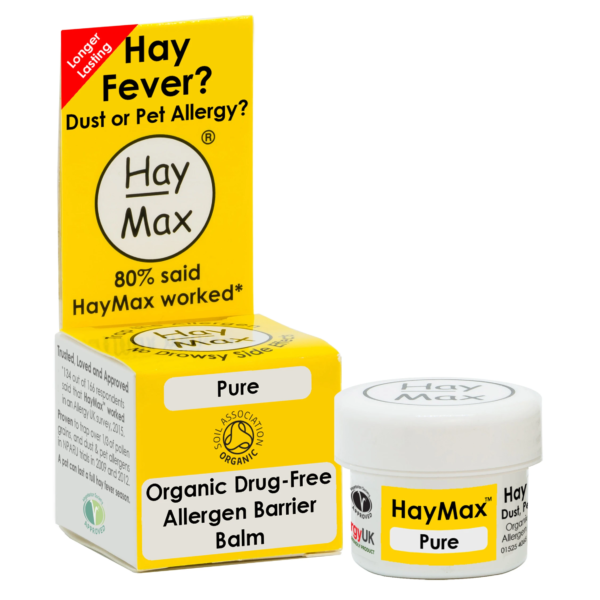
https://haymax.biz/
HayMax™ Pure (approx 5ml) – contains no essential oils. We were asked for a version with no added fragrance or essential oil by many people. So if you’re sensitive, but need to block the pollen, then choose HayMax™ Pure.
HayMax is drug-free, non-drowsy, certified organic and 100% natural. HayMax is applied topically with a finger, to the rim of the nostrils and bones of the eyes. It’s not invasive, is incredibly easy to use and can be applied as often as necessary throughout the day.
Ingredients: Organic Sunflower Oil, Organic Beeswax and Natural Vitamin E. And that’s it!
Electroflytes – Hydration For Flying
Electroflytes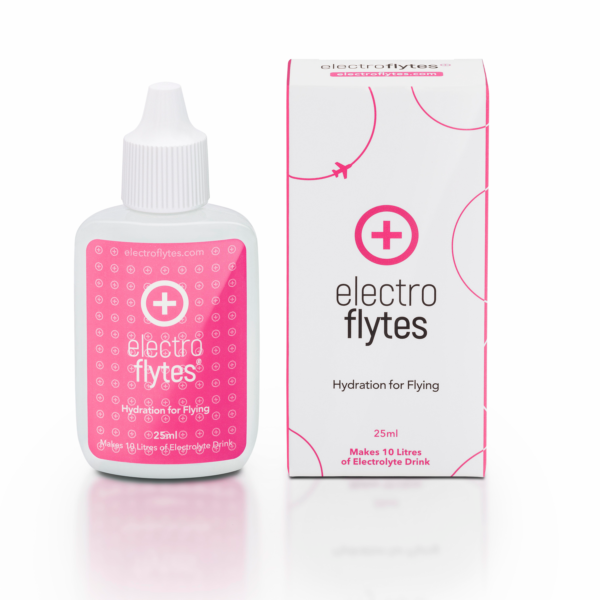
www.electroflytes.com
Introducing ElectroFlytes®, the revolutionary hydration concentrate specifically designed to combat the dehydrating effects of air travel. With cabin humidity levels at 39,000 feet significantly lower than on the ground, passengers often face dehydration, dry skin, increased susceptibility to infections, and exacerbated jet lag. ElectroFlytes is here to change that.
ElectroFlytes is a powerful hydration solution that turns any drink into an electrolyte-fueled beverage. Just a few drops from our convenient 25ml bottles, which are easily carried through customs, transform ordinary water into a supercharged hydration drink. Each bottle can make up to 10 liters of electrolyte drinks, ensuring that travelers can stay hydrated throughout their journey.
Green People SPF15 Sun Cream with Natural Insect Repellent.
Green People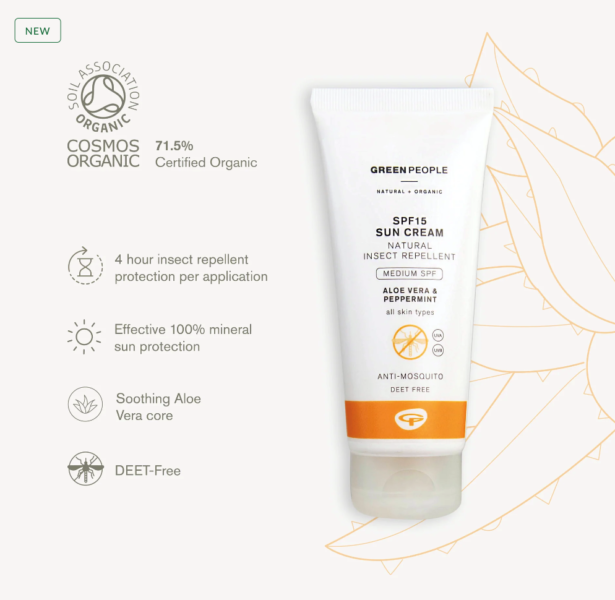
https://www.greenpeople.co.uk/
Protect, soothe and repel with the latest SA COSMOS Organic approved sun care innovation from the organic skin care pioneers, Green People.
Hated by pesky mosquitoes but loved by sensitive skin, NEW SPF15 Sun Cream with Natural Insect Repellent naturally protects against sun damage and biting insects so that you can enjoy time outdoors worry free.
A summer essential for gardeners, campers and adventurers, Zinc Oxide mineral filters provide effective protection against UVA and UVA rays a DEET-free Citrepel75 (derived from Java Citronella) naturally repels biting insects for up to 4 hours.
incognito Lightweight natural insect repellent bracelet
incognito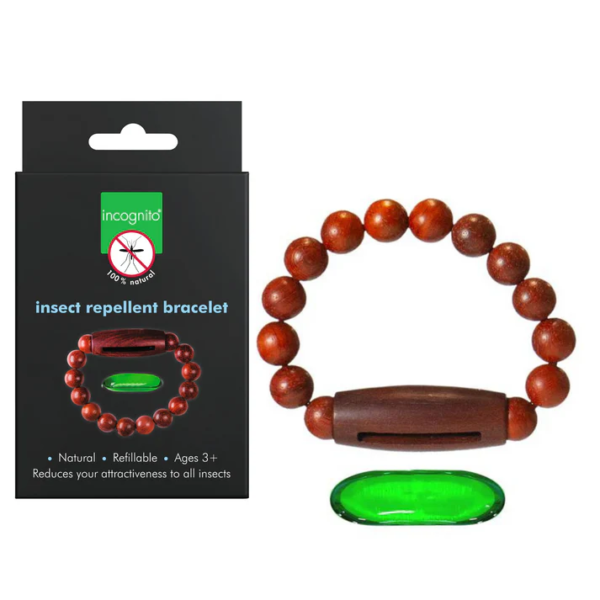
https://www.lessmosquito.com/
This reusable natural, hand-crafted wooden-bead insect repellent bracelet helps keep mosquitoes, midges, gnats, horseflies, fleas and other biting and stinging insects away for 18 days or more per capsule. The capsule contains high grade insect repellent oils including java citronella, lemon eucalyptus and peppermint oil, to repel insects.
In our current throwaway culture, incognito’s bracelet is refreshingly 100% natural, plastic free, reusable and refillable. It can be used from age 3 upwards, reducing the wearer’s attractiveness to insects. Simply push out the old capsule with a pen or similar object and pop in a fresh one every 18 days. Store capsules in their biodegradable resealable bags for freshness when not in use.


